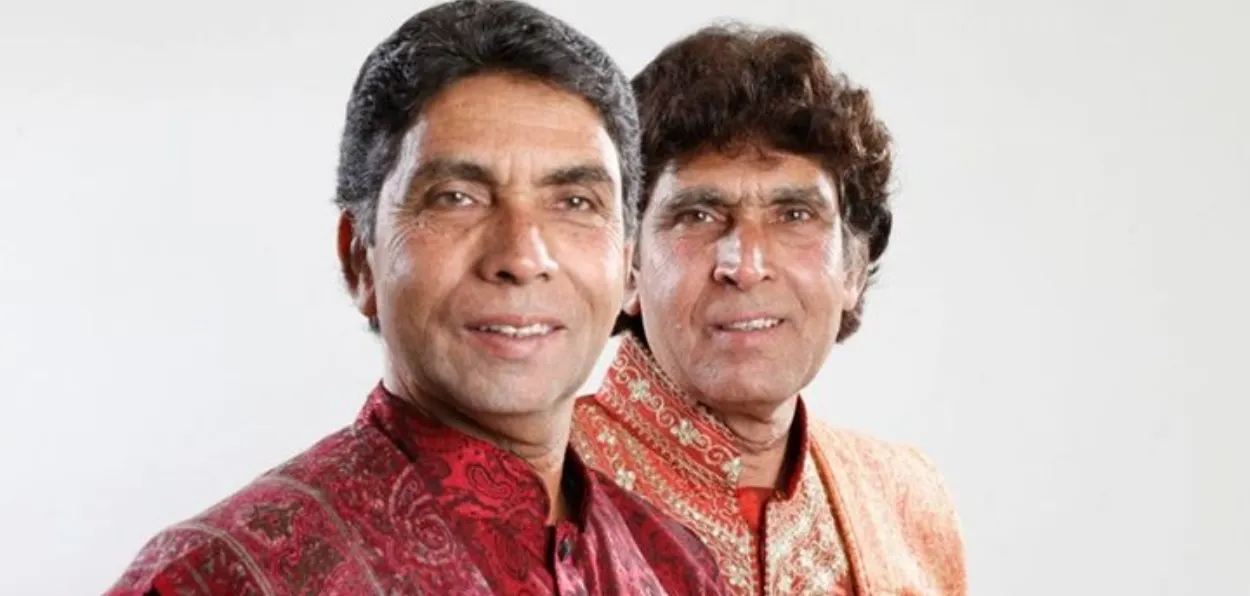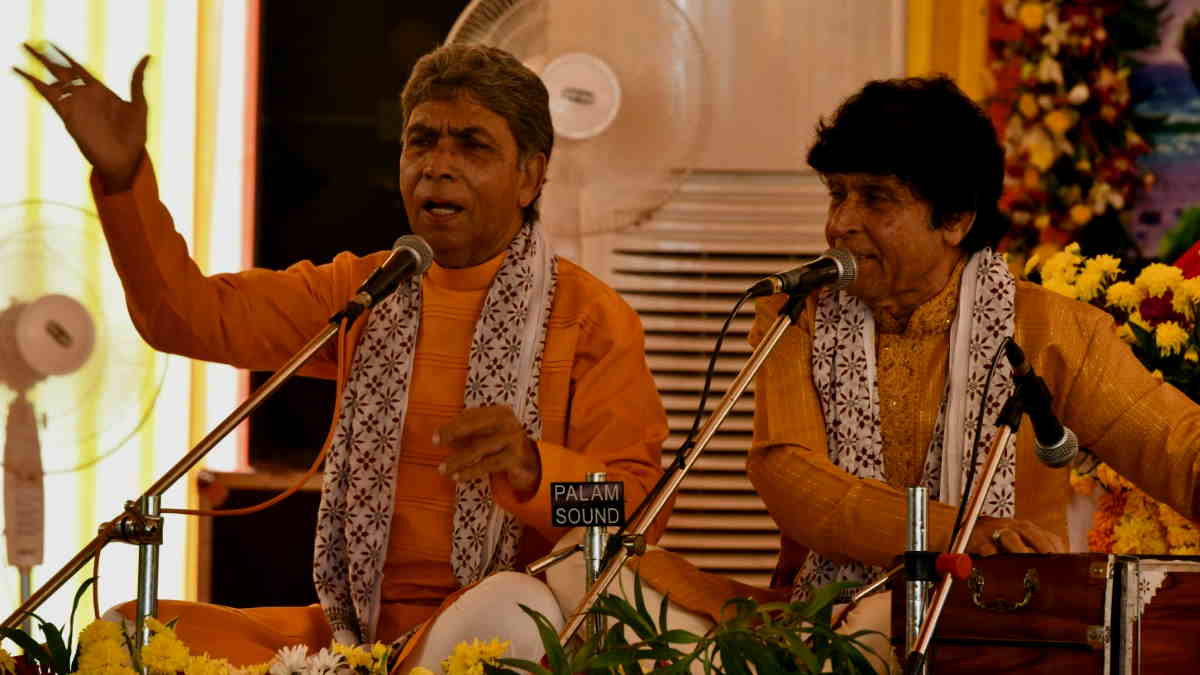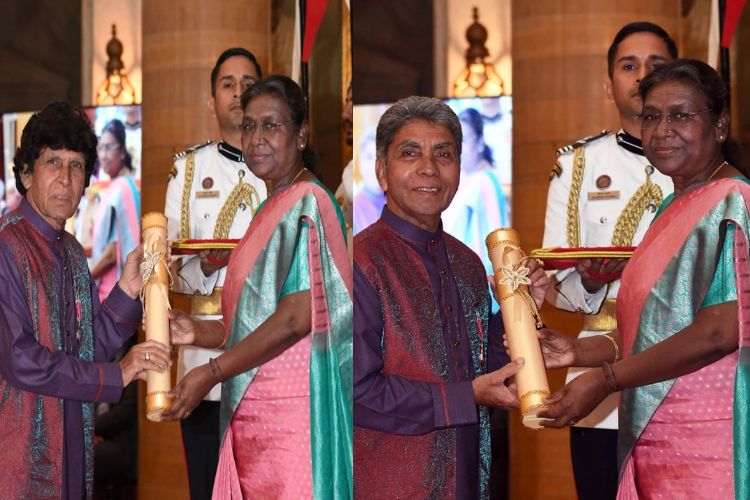
Vidushi Gaur/New Delhi
In an era where digital beats and fleeting trends often dominate music, the timeless elegance of Ghazal finds its torchbearers in the legendary duo - Ustaad Ahmed Hussain and Mohammed Hussain.
Conversation With Legends
Honoured with the Padma Shri for their extraordinary contribution to Indian classical and semi-classical music, the Hussain brothers have spent over five decades nurturing and elevating the art of Ghazal singing, ensuring its soul continues to resonate across generations.
Hailing from the Jaipur Gharana and trained under their father, Ustaad Afzal Hussain, the brothers have become synonymous with lyrical depth and classical finesse. Honoured with the Padma Shri and several national accolades, the Hussain brothers continue to mesmerise audiences, not just in India, but across the globe.
Ustaad Ahmed Hussain and Mohammed Hussain performing at an event
Ustaad Ahmed Hussain and Mohammed Hussain sat down with us at Awaz-the Voice to reflect on their journey, inspirations, and the evolving genre of Ghazal. Excerpts from our conversation:
Music is said to unite hearts and transcend boundaries. What are your thoughts on its role in unifying India?
Mohammed Hussain: Music is a universal language. Whether it’s Bhajans or Sufi music, each form must be sung with soul, with bhakti and forgiveness. That essence only comes from learning under a true Ustaad.
Ahmed Hussain: Absolutely. Music has no borders. It touches hearts where words fail, just like shayari. Our Ganga-Jamuni Tehzeeb is unique and found only in India. We’ve performed worldwide, but nothing compares to the love we receive here. Fame can be bought, but the affection of the Indian audience is priceless. For any artist, this country offers the greatest stage, all it asks in return is mehnat (hard work).
You have beautifully balanced both Ghazals and Bhajans. Tell us about this journey.
Ahmed Hussain: A person plays many roles in life, father, son, and friend, but the soul remains one. Similarly, when we sing Ghazals, there must be kindness; when we sing Bhajans, one must surrender. As Farid Tonki beautifully wrote, "Raste alag alag hain, thikana toh ek hai, manzil har ek shakhs ko paana toh ek hai." Temples and mosques may differ, but the destination is one.
 Ustaad Ahmed Hussain and Mohammed Hussain
Ustaad Ahmed Hussain and Mohammed Hussain
How did it feel to receive the Padma Shri Award?
Mohammed Hussain: On 17th January 2018, we were honoured with the Sangeet Natak Akademi Award by former President Ram Nath Kovind. Later, on 5th April 2023, we received the Padma Shri from President Droupadi Murmu. And on 30th November 2023, we were conferred a doctorate in Ghazal by Mahatma Jyotirao Phule University. Each honour belongs to our Ustaads and our parents’ blessings.
Ahmed Hussain: Awards are not just achievements; they are responsibilities. Once honoured, you must live up to that legacy. Constant riyaz and humility are key.
In today’s fast-paced world, music often becomes therapy. How do you see its role in mental well-being?
Ahmed Hussain: Music is meditation. Whether you sing or listen, it takes you to a world where anxiety and sadness don’t exist. It fills you with peace.
 Ustaad Ahmed Hussain and Mohammed Hussain performing at an event
Ustaad Ahmed Hussain and Mohammed Hussain performing at an event
Mohammed Hussain: As Momin Khan Momin wrote, "Tum mere paas ho goya, jab koi doosra nahi hota." Music is a companion. When you're immersed in it, everything else fades into joy.
Tell us about your journey from Jaipur to Mumbai.
Ahmed Hussain: We belong to the Jaipur Gharana, with seven generations in music. Our father, the Late Ustaad Afzal Hussain Khan sahab, was both our guru and our guide. He believed music must be learned in a gurukul, with complete surrender. True learning comes from going to the master, not summoning him.
Mohammed Hussain: We began in 1959. Our father made us struggle deliberately, not to test us, but to teach us value. Though he could have given us an easy path, he chose to prepare us for the long journey. We struggled for 20 years in Mumbai, but eventually, it gave us everything.
You began as child artists with Akashvani. Do you remember your first song?
Ahmed Hussain: Yes, we started in 1959. That first song and the appreciation we received are memories we cherish even today. We were given diplomas and certificates; those moments were the foundation of our careers.
(The brothers sang the song, their voices still echoing the innocence and charm of those early years.)
Ustaad Ahmed Hussain and Mohammed Hussain performing at an event
Your first album Guldasta is legendary. Any anecdotes?
Ahmed Hussain: Guldasta was composed in 1978. We sang “Main hawa hoon, kahaan watan mera” on a request from the late Ameeq Ahmad Hannafi, the AIR director in Ambikapur.
Mohammed Hussain: Later, the legendary Padma Shri Sitara Devi ji introduced us to Kalyanji-Anandji. We recorded the album in 1979, and it was released in 1980. It’s still loved today — a gift from the universe.
How was your experience singing for Veer Zaara?
Ahmed Hussain: Yash Chopra ji wanted us to sing a Qawwali. We were hesitant, it wasn’t our comfort zone. But he believed that anyone trained in Hindustani classical can sing anything. The song was composed by our father, lyrics by Javed Akhtar, and it turned out beautifully.
Mohammed Hussain: Gulshan Kumar once asked us if we knew Bhajans. We lit up! He respected our wish and even removed his shoes before entering the studio for recordings. We now have five Bhajan albums. Whether it’s Ghazals or Bhajans, it’s always been about surrendering to the art.
 Ustaad Ahmed Hussain and Mohammed Hussain recieving the Padma Shri Award from President Droupadi Murmu
Ustaad Ahmed Hussain and Mohammed Hussain recieving the Padma Shri Award from President Droupadi Murmu
Tap here to watch the full video of the interview.
What message would you like to give aspiring singers?
Hussain Brothers: We are still students of music. But if we may share, art demands patience, humility, and dedication. Don’t chase fame or wealth. Seek knowledge, and follow your Ustaad sincerely. The rest will follow.
And as we part, a couplet from our hearts:
“Meherbaan ho ke bula lo humein chaho jis dum,
Hum gaye waqt nahi hain ki aa bhi na sakein.”
The legacy of Ustaad Ahmed Hussain and Mohammed Hussain is not just built on their music, but on the values they represent — humility, discipline, and a profound respect for art. In their voices, Ghazal lives on — eternal, elegant, and ever-resonant.
